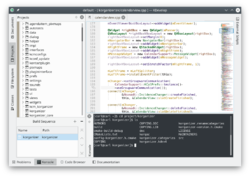KDevelop/de: Difference between revisions
Appearance
Updating to match new version of source page |
Updating to match new version of source page |
||
| Line 8: | Line 8: | ||
The KDevelop project started in 1998 at the University of Potsdam (Germany). The first released 0.1 was released the same year<ref>[https://marc.info/?l=kde-announce&m=90648146015087&w=2 KDevelop 0.1 announcement]</ref>. | The KDevelop project started in 1998 at the University of Potsdam (Germany). The first released 0.1 was released the same year<ref>[https://marc.info/?l=kde-announce&m=90648146015087&w=2 KDevelop 0.1 announcement]</ref>. | ||
KDevelop has experienced several rewrites. The first time was with version 3.x by Bernd Gehrmann in 2001<ref>[https://marc.info/?l=kde-core-devel&m=98598814600661&w=2 A new IDE for a new millennium :-) by Bernd Gehrmann]</ref> and the second time was with version 4.x with a more object-oriented architecture in 2009<ref>[https://apaku.wordpress.com/2009/11/29/kdevelop4-moved/ KDevelop4 moved]</ref>. | KDevelop has experienced several rewrites. The first time was with version 3.x by Bernd Gehrmann in 2001<ref><!--(-->[https://marc.info/?l=kde-core-devel&m=98598814600661&w=2 A new IDE for a new millennium :-) by Bernd Gehrmann]</ref> and the second time was with version 4.x with a more object-oriented architecture in 2009<ref>[https://apaku.wordpress.com/2009/11/29/kdevelop4-moved/ KDevelop4 moved]</ref>. | ||
The development of KDevelop 5 started in August 2014 as a port of the KDevelop 4 codebase for qt5 and kf5<ref>[https://www.kdevelop.org/frameworks/kdevelop-master-now-depends-kde-frameworks-5 KDevelop master now depends on KDE Frameworks 5!]</ref>. The custom c++ parser was abandoned in favor of clang and the CMake interpreter was also replaced in favor of using the JSON metadata given by CMake. KDevelop 5 was released in August 2016<ref>[https://www.kdevelop.org/news/kdevelop-500-released KDevelop 5.0.0 release]</ref>. | The development of KDevelop 5 started in August 2014 as a port of the KDevelop 4 codebase for qt5 and kf5<ref>[https://www.kdevelop.org/frameworks/kdevelop-master-now-depends-kde-frameworks-5 KDevelop master now depends on KDE Frameworks 5!]</ref>. The custom c++ parser was abandoned in favor of clang and the CMake interpreter was also replaced in favor of using the JSON metadata given by CMake. KDevelop 5 was released in August 2016<ref>[https://www.kdevelop.org/news/kdevelop-500-released KDevelop 5.0.0 release]</ref>. | ||
| Line 14: | Line 14: | ||
== Features<ref>[https://www.kdevelop.org/features KDevelop feature]</ref> == | == Features<ref>[https://www.kdevelop.org/features KDevelop feature]</ref> == | ||
* | * Support C, C#, C++, CUDO, OpenCL, Qt QML, Javascript, Python and PHP | ||
* Support multiple version control systems Git, Bazaar, Subversion, CVS, Mercurial (hg), Perforce | * Support multiple version control systems Git, Bazaar, Subversion, CVS, Mercurial (hg), Perforce | ||
Revision as of 07:20, 4 July 2019
 |
An Integrated Development Environment (IDE) for MS Windows, Mac OS X and Linux |
== Geschichte (von Wikipedia inspiriert)
The KDevelop project started in 1998 at the University of Potsdam (Germany). The first released 0.1 was released the same year[1].
KDevelop has experienced several rewrites. The first time was with version 3.x by Bernd Gehrmann in 2001[2] and the second time was with version 4.x with a more object-oriented architecture in 2009[3].
The development of KDevelop 5 started in August 2014 as a port of the KDevelop 4 codebase for qt5 and kf5[4]. The custom c++ parser was abandoned in favor of clang and the CMake interpreter was also replaced in favor of using the JSON metadata given by CMake. KDevelop 5 was released in August 2016[5].
Features[6]
- Support C, C#, C++, CUDO, OpenCL, Qt QML, Javascript, Python and PHP
- Support multiple version control systems Git, Bazaar, Subversion, CVS, Mercurial (hg), Perforce
- Support multiple build system CMake, QMake, Makefile, Meson[7], ...
- Quick Code Navigation (Jump to declaration/definition)
- Code comprehension (Syntax highlighting, semantic code completion)
- Documentation integration
- Integration support for multiple static analyzers: Clang-tidy, Clazy and the Cppcheck
